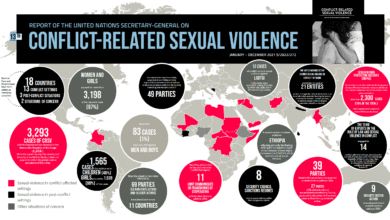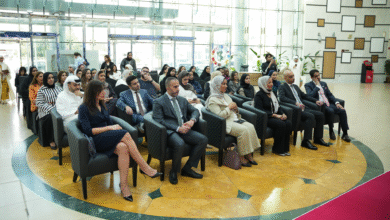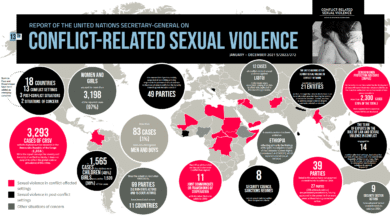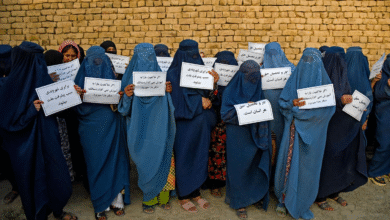Women in Humanitarian Crises: A Call to Action
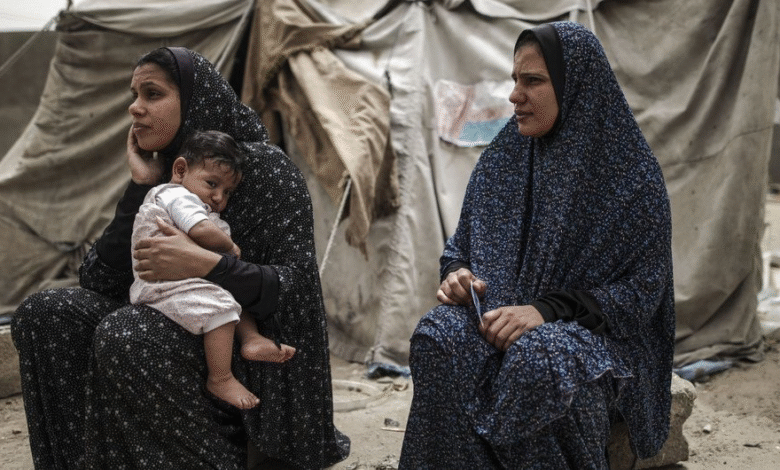
Women in humanitarian crises often face dire challenges, particularly when it comes to their health and safety. As wars, natural disasters, and severe climate conditions sweep through regions, the risk of gender-based violence escalates, leaving countless women vulnerable and without protection. Recent funding cuts to the United Nations Population Fund (UNFPA) compound these issues, jeopardizing crucial services for reproductive and maternal health just when they are most needed. The scarcity of resources means that life-saving care and safe spaces for survivors are dwindling, threatening the very lives of millions. The global community must act now to ensure that women in these crises receive the humanitarian response they desperately require.
Women affected by crises—whether due to armed conflict, natural disasters, or severe economic hardship—face distinct and urgent challenges that demand immediate attention. In these volatile environments, the prevalence of violence against women increases substantially, with many unable to access essential reproductive and maternal health services. The drastic cuts to international funding, particularly from organizations like UNFPA, risk dismantling existing frameworks designed to protect and empower women. As conditions worsen and healthcare systems collapse, the fate of countless women hangs in the balance, underscoring the need for a robust humanitarian response tailored specifically to their unique needs. Addressing these issues is crucial for ensuring the health and safety of women navigating the uncertainties of crisis.
The Urgent Need for Support for Women in Humanitarian Crises
Women and girls living in humanitarian crises are at a heightened risk due to the compounded effects of conflict, climate change, and inadequate healthcare resources. The current situation demands urgent humanitarian intervention as these vulnerable groups often face gender-based violence, inadequate reproductive health services, and the looming threat of maternal mortality. This is particularly concerning in countries where recent funding cuts from organizations like UNFPA have drastically reduced the essential services that support these women. Without adequate support, we risk exacerbating their suffering and neglecting their basic human rights.
As the UNFPA warns, the lack of funding has severe implications not only for maternal health but also for the health and safety of newborns. Women facing such crises are often deprived of critical healthcare services that could prevent complications during childbirth and ensure safe pregnancies. The consequences are dire: increased rates of maternal mortality and morbidity, compounded by limited access to obstetric care and reproductive health services. Therefore, it is imperative that international bodies invest resources to ensure that women in humanitarian crises receive the care and attention they urgently need.
The Impact of UNFPA Funding Cuts on Reproductive Health
The significant funding cuts announced by the United States, amounting to approximately $330 million, threaten the operational capacity of the UNFPA to provide essential reproductive health services worldwide. These cuts will compromise efforts aimed at reducing maternal deaths and addressing gender-based violence, particularly in crisis-affected regions. For millions of women, this translates to a precarious lack of access to pregnancy care, contraception, and essential healthcare services necessary for maintaining maternal health. The repercussions of such funding reductions are already palpable, leading to supply shortages of medicines, midwives, and life-saving interventions that are crucial in crisis situations.
In regions like Afghanistan, already grappling with one of the worst humanitarian crises, these funding cuts will exacerbate existing vulnerabilities among women. The UNFPA’s humanitarian response plans, which are underfunded by over 30 percent, illustrate a worrying trend that threatens not only reproductive health but also the safety and dignity of women and girls during emergencies. As the situation deteriorates, millions of women may have to forgo vital health services, increasing their vulnerability to gender-based violence and other health risks resulting from inadequate maternal care.
Gender-Based Violence in Crisis Situations
Gender-based violence (GBV) stands as a critical issue in humanitarian settings, where the breakdown of social structures often leads to increased risks for women and girls. Recent estimates indicate that 70 percent of women in crisis regions experience some form of GBV, a staggering figure that underscores the urgent need for preventative measures and support services. In areas affected by conflict or disaster, violence can escalate rapidly, leaving women with little protection and few resources to turn to for help. This highlights the necessity of integrating GBV prevention strategies into all humanitarian responses.
Moreover, addressing gender-based violence is not just an immediate need but an essential part of ensuring long-term recovery and stability in affected communities. The UN’s call for prioritizing women’s health, safety, and rights in humanitarian responses is aimed at safeguarding these vulnerabilities. Comprehensive support and resources for survivors of gender-based violence should be a cornerstone of any humanitarian intervention, providing not only immediate relief but also fostering resilience and empowerment among affected women.
Maternal Health Challenges in Crisis Contexts
Maternal health often suffers in humanitarian crises due to disruption of healthcare services, limited access to vital medicines, and increased risks during pregnancy. In many areas, like Gaza, pregnant women face insurmountable challenges as ongoing conflicts hinder access to medical facilities and essential care. UNFPA reports have highlighted alarming statistics, noting that around 60 percent of preventable maternal deaths occur in crisis-hit countries. As such, ensuring that pregnant women receive proper maternal care is vital in these contexts to combat this distressing statistic.
The lack of support for maternal health services not only endangers women but also affects newborns and entire communities. Programs aimed at providing prenatal and postnatal care, emergency obstetric services, and education around reproductive health are crucial for curbing the cycle of maternal mortality and morbidity. By focusing on these essential services, humanitarian responses can create sustainable solutions that not only address the immediate needs during crises but also lay the groundwork for improved health outcomes in the future.
The Consequences of Healthcare System Collapses
In regions experiencing humanitarian crises, the collapse of healthcare systems has devastating implications for women and children. With hospitals under attack and medical personnel overwhelmed or absent, access to healthcare becomes severely restricted. Pregnant women find themselves at particular risk, as they may be forced to forgo necessary medical care during pregnancy and childbirth due to lack of available services or fear for their safety. This dire situation places an increased burden on women as they navigate not only their health but also the health of their unborn children.
The healthcare challenges are compounded by a lack of funding for essential services, which can lead to an increase in maternal death rates and poor health outcomes. The urgent need for financial investment in the healthcare infrastructure and proper training for medical staff becomes apparent as healthcare systems struggle to cope with the high demand. Addressing these challenges is not only a humanitarian imperative but also a strategic necessity for rebuilding health systems post-crisis.
Ensuring Women’s Rights Amid Emergencies
In humanitarian crises, women’s rights can often be sidelined as the focus shifts to immediate survival and security concerns. However, it is paramount that humanitarian agencies continue to maintain women’s health, safety, and rights as fundamental priorities in their response strategies. Women in crisis scenarios are usually subject to a myriad of vulnerabilities, including violence, exploitation, and discrimination; thus, addressing these issues is crucial for their dignity and well-being.
Maintaining a rights-based approach in humanitarian work ensures that women are not merely seen as victims but as active agents of change in their communities. Programs promoting legal support, education, and economic empowerment can help to restore their autonomy and facilitate recovery processes. By integrating gender considerations and women’s rights into the fabric of humanitarian efforts, organizations can better address the unique needs of women in emergencies, thus promoting resilience and health outcomes.
The Role of International Organizations in Protecting Women
International organizations, such as UNFPA, play a vital role in safeguarding women’s rights and health in humanitarian crises. They not only provide essential medical care but also advocate for policies that prioritize women’s health needs, ensuring that funding and resources are allocated appropriately. As seen in various crisis situations globally, their ability to coordinate on-the-ground responses can lead to life-saving interventions for women facing unprecedented challenges, including gender-based violence, maternal health emergencies, and acute malnutrition.
Additionally, these organizations serve as crucial advocates for policy changes that aim to protect and empower women in crisis-impacted regions. By raising awareness about the challenges women face and the necessity for funding, international agencies can mobilize support from governments and donors alike. Their commitment to ensuring that women’s health and rights remain a priority during humanitarian responses is instrumental in creating a safer and more equitable environment for vulnerable populations.
Advocacy Efforts and Public Awareness Campaigns
Advocacy plays a critical role in raising public awareness and mobilizing support for women’s issues in crisis situations. Campaigns such as UNFPA’s ‘Don’t Let the Lights Go Out’ aim to shine a light on the plight of women and girls affected by humanitarian disasters, urging the global community to take action. The success of these campaigns largely depends on effectively communicating the dire circumstances faced by women in crisis zones, as well as the urgent need for increased funding to support humanitarian initiatives focusing on women’s health and rights.
Public awareness campaigns also help in building a broader understanding of the issues surrounding gender-based violence, reproductive health, and maternal health within humanitarian contexts. By engaging communities, stakeholders, and policymakers, organizations can foster a culture of support and action aimed at protecting the rights of women in emergencies. This collective effort is vital in ensuring that women’s health and safety receive the attention they deserve, ultimately contributing to more effective humanitarian responses.
The Future of Women’s Health in Hard-Hit Regions
Looking forward, the health and safety of women in crisis areas must be prioritized to pave the way for recovery and rebuilding. With ongoing conflicts and climate challenges threatening communities, addressing reproductive health needs becomes an urgent necessity. Humanitarian responses that integrate a gender lens can greatly improve health outcomes for women while also addressing broader societal issues such as gender-based violence and maternal health complications.
Investing in women’s health is not only a moral obligation but also vital for societal stability. When women are healthy, educated, and empowered, they can contribute significantly to rebuilding their communities. Therefore, as global efforts continue to address the aftermath of crises, investing in initiatives that support women’s health rights and addressing the detrimental effects of recent funding cuts will be crucial in changing the narrative for women in humanitarian crises moving forward.
Frequently Asked Questions
How are women in humanitarian crises affected by gender-based violence?
Women in humanitarian crises face an alarming increase in gender-based violence, with 70 percent being subjected to such violence, which is double the rate compared to non-crisis settings. The lack of resources and security exacerbates their vulnerability, making it critical to address these issues through comprehensive humanitarian responses.
What are the implications of UNFPA funding cuts for reproductive health in humanitarian crises?
The recent UNFPA funding cuts, totaling approximately $330 million globally, severely undermine reproductive health services in humanitarian crises. This results in fewer midwives, limited access to essential medications, and a decrease in safe spaces for women, further threatening maternal health and leading to preventable deaths in vulnerable populations.
Why is maternal health particularly critical in the context of humanitarian response for women?
Maternal health is crucial in humanitarian crises because around 60 percent of preventable maternal deaths occur in affected countries. A focused humanitarian response for women ensures that they receive necessary healthcare before, during, and after childbirth, which is vital for survival and the well-being of mothers and their newborns.
What can be done to improve the situation for women and girls in humanitarian crises facing health challenges?
To improve the situation for women and girls in humanitarian crises, it is essential to increase funding for health services, particularly those addressing reproductive health and gender-based violence. Campaigns like UNFPA’s ‘Don’t Let the Lights Go Out’ aim to raise awareness and secure funding to ensure women’s health, safety, and rights remain a priority in humanitarian responses.
How does climate change impact women in humanitarian crises with regards to health?
Climate change significantly impacts women in humanitarian crises by exacerbating existing vulnerabilities. It leads to displacement, worsening health conditions, and increased risks of gender-based violence. Pregnant women are particularly at risk, facing challenges from malnutrition and limited access to healthcare in crisis-hit areas.
What role does international aid play in supporting women in humanitarian crises?
International aid is vital in supporting women in humanitarian crises by providing emergency healthcare, protection services, and resources to combat gender-based violence. Adequate funding and investment in women’s health initiatives can significantly reduce maternal mortality rates and enhance the overall safety and well-being of women and girls in these challenging environments.
What are the specific maternal health needs of women in crisis settings?
Women in crisis settings require access to prenatal and postnatal care, safe childbirth options, emergency obstetric services, and support for mental health issues arising from trauma and stress. The humanitarian response must also address nutritional needs and provide education on safe reproductive health practices to ensure the health of mothers and their babies.
How does access to healthcare affect gender-based violence in humanitarian settings?
Access to healthcare is crucial in addressing gender-based violence in humanitarian settings. Lack of medical resources hinders the ability to treat survivors and perpetuates a cycle of violence. Ensuring healthcare access for women enables them to seek support, report incidents, and receive necessary medical attention, which is critical in mitigating the impacts of violence.
What are the consequences of neglecting women’s health in humanitarian crises?
Neglecting women’s health in humanitarian crises leads to increased maternal deaths, higher rates of gender-based violence, and overall deterioration of community health. Failure to prioritize women’s needs not only endangers their lives but also undermines the stability and recovery of entire communities affected by crises.
What is the significance of the ‘Don’t Let the Lights Go Out’ campaign?
The ‘Don’t Let the Lights Go Out’ campaign highlights the urgent needs of women in humanitarian crises, calling for increased funding and attention to their rights and health. It aims to raise awareness of the challenges faced by women and girls, ensuring that their health, safety, and rights are fundamental priorities in humanitarian responses.
| Key Point | Details |
|---|---|
| Crisis Impact on Women | Women and girls in humanitarian crises face heightened risks, including gender-based violence and maternal health issues. |
| Funding Cuts | Recent cuts in funding from the United States threaten vital reproductive health services and support for recovering from gender-based violence. |
| Conditions in Crisis Zones | 70% of women in crisis zones experience gender-based violence; many maternal deaths are preventable but occur in these settings. |
| Healthcare System Failure | Healthcare systems are severely compromised; attacks on medical facilities contribute to worsening maternal health outcomes. |
| Specific Case: Gaza | Pregnant women and children face extreme malnutrition, with dire implications for health outcomes. |
| Funding Needs | UNFPA is seeking $99 million for Palestine to address health and safety needs, but only $12.5 million has been raised so far. |
Summary
Women in humanitarian crises are facing unprecedented challenges, as essential reproductive health and support services become increasingly endangered due to significant funding cuts. The alarming rise in gender-based violence, coupled with the dire state of healthcare systems, underscores the urgent need for renewed focus and funding to protect the health and rights of these women and girls. Campaigns like ‘Don’t Let the Lights Go Out’ highlight the critical necessity of ensuring support for women in crisis, as their safety and well-being remain paramount in humanitarian responses.

